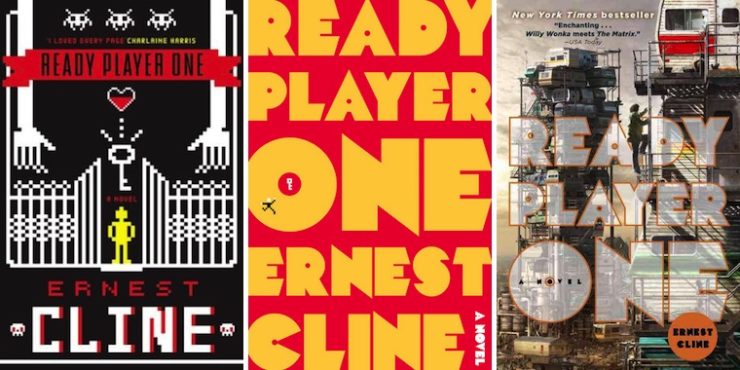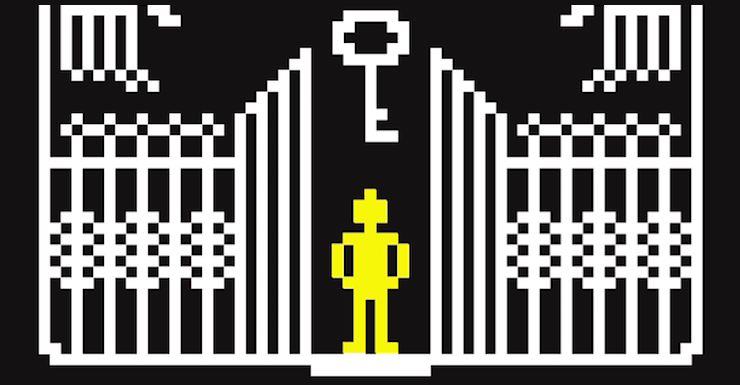Let me just say something right at the start, because it needs to be said: I love Ernest Cline’s Ready Player One.
Normally, I wouldn’t have to thrust such a declarative statement at the top of my post; but, the thing is, what started as a simple review of the book leading up to the movie has turned into a defense, strangely. Because at this point in time, it’s impossible to talk about Ready Player One without acknowledging the chatter surrounding it. And there’s a lot of chatter.
Now, far be it for me to tell people what opinions they should and shouldn’t have. I certainly don’t want to argue someone down from their own conclusions. What I’m writing here is my take on the book—particularly why I enjoyed it so much, and why, to me, it’s an important book for our time. Is Ready Player One a nostalgia-fueled, reference-laden, nerdgasm of a story? Yup. To the nth degree. But it’s more than that—so much more than that—and once you strip away some of the more superficial elements, you find a story that speaks to a generation’s loneliness with great profundity and heart.
The story of Ready Player One is pretty straightforward: In the near future, an energy crisis has altered the face of the world. Overpopulation, global warming—all these very real threats have exacted some serious consequences on the Earth. Because of that, much of the United States population now live in what’s called the stacks—literally mobile homes stacked, quite unsafely, on top of one another. To escape this grim reality, many people have discovered a new reality in the OASIS—a virtual reality world created by Steve Jobs-ian (if Jobs was addicted to Atari, ’80s movies, and D&D) tech genius James Halliday. When Halliday dies, he leaves behind the ultimate game—a hunt for the world’s most valuable easter egg, hidden somewhere within the OASIS. Whoever finds the egg inherits the OASIS. Which is a big deal, because not only is the OASIS pretty much the entire world, it’s also worth a whole lot of money.
Cline keeps the narrative—and the hunt to locate the egg—focused on Wade Watts, a high school student eking out a fairly miserable existence in the stacks. His parents died when he was young, forcing him to move in with his aunt, who doesn’t really want him around; he seemingly has no friends, and he certainly has no prospects for the future. Wade pretty much has nothing—except the OASIS and his obsession with Halliday.
That obsession, of course, serves him well. Halliday’s game is more than just a game, it’s a journey through all the pop culture he loved—video games, music, movies, role playing games, comics, everything. In order to decipher the game’s code, the player has to decipher Halliday’s code, and Halliday’s code, his life, was the sum of all the things he lovingly obsessed over. It’s like John Cusack said in High Fidelity, “It’s what you like, not what you are like.” As such, Halliday takes the players on an odyssey through his past—literally, at times. Wade—whose avatar in the OASIS is known as Parzival—unlocks clues seeded in Halliday’s favorite games, in his childhood home, even in the relationships (and regrets) that colored the world he knew.
In a certain sense—and a very true sense—you can easily look at Wade’s journey as being nothing more than a trip down the Yellow Brick Road, where the bricks have been swapped out with reference upon reference to nerd culture. It’s undeniable, as that is the fabric of the book. The tapestry of Ready Player One is woven with pop culture, and it’s this use of pop culture that’s drawn a lot of criticism.

Again, I’m not here to argue anyone down, but it’s nearly impossible to write about a book so long after its release—and a juggernaut of a book, at that—without acknowledging what’s been said about it. And because Cline’s usage of pop/gaming/movie/nerd culture is so indelible to Ready Player One, it can’t be overlooked—nor should it be. This is what the book is.
The thing is, though, is that Cline has drawn a lot of heat for indulging too deeply in nerd culture—exploiting it, even, and using it as a crutch to tell less of a story and more of a nostalgia pastiche. Obviously, since I love the book, I disagree with this sentiment. But—this specific take, which is common enough, is certainly worth discussing, particularly the way Cline builds his world around things he clearly loves.
Now, I don’t want to reduce a defense of Ready Player One to “hey, write what you know!” because that’s lazy and it doesn’t capture the point. I’ve faced similar criticism in my own work (obviously not as extensive as the chatter surrounding Ready Player One—though I wish!); my novel, Black Star Renegades, is unapologetically a love letter to Star Wars. I make no effort to hide the fact. And that’s bothered some people, and I’ve been asked, a number of times, why I did that. To me, the answer is obvious: It’s because I’m capturing the world as I understand, which is what writers do. Let’s take this quote from David Foster Wallace:
The world that I live in consists of 250 advertisements a day and any number of unbelievably entertaining options, most of which are subsidized by corporations that want to sell me things. The whole way that the world acts on my nerve endings is bound up with stuff that the guys with leather patches on their elbows would consider pop or trivial or ephemeral. I use a fair amount of pop stuff in my fiction, but what I mean by it is nothing different than what other people mean in writing about trees and parks and having to walk to the river to get water a 100 years ago. It’s just the texture of the world I live in.
The texture of the world I live in.
That, right there, is everything. The texture of my world is Star Wars, amongst other things. I grew up in front of TV/video game console/stack of books and comics. That is the texture of my world, for better or worse. I think it’s safe to say that Cline shared this experience. The important question, though, is what you do with this texture. For me, it was about deconstructing the pulp hero mythos. For Cline, Ready Player One is, in part, about taking a look at why escapism is so powerful, so addicting, so essential for so many people.
(And if you really want to get deep into seeing how influence shapes writers, read Jonathan Lethem’s excellent essay on the subject.)
On its surface, Ready Player One is, unquestionably, a rollicking adventure story with more geeky references than you can shake a Power Glove at. To a degree, Ready Player One is the sum of its many, many parts. And on that level, Ready Player One is an engaging, candid, fun story that, for as deep as it goes into nerd culture, isn’t so impenetrable that the casual geek or the non-geek can enjoy it (it wouldn’t have sold a trillion copies if that were the case).
But deeper than that, perhaps Ready Player One’s greatest strength is the way if humanizes escapism. We live in a world where—despite nerd culture’s proliferation into mainstream pop culture—being a gamer, comic reader, whatever, is still stigmatized; to some people, you’re still the “dork who lives in his mom’s basement playing Fallout for ten hours a day.” And while I find that perspective childish and cruel, there is a kernel of truth in the fact that people who fall into games, comics, books, movies, etc. (people like myself) tend to fall into them hard. It’s not enough to play a game, you have to 100% complete a game; it’s not enough to read one comic, you have to read all the comics. And while insults are lobbed at this penchant for obsessive escapism, no one ever really asks why.
Ready Player One does.
While Cline doesn’t attack this examination of loneliness with the same kind of penetrating eye that’s present in works like the wonderful novel Wolf in White Van, he does capture the sadness and isolation of people like Wade in a genuine and touching way, peeling back that the layers of that crucial “why” in a way so few mainstream stories do. Wade’s troubles accepting who he is and the conflicted comfort he finds in the OASIS is very much a focus of the book—and that goes for other characters as well. Ready Player One shows why Wade and people like him look to escape from their real world into something else; granted, the stakes in Cline’s dystopian world are much higher (though our world is getting there!), but the core of loneliness experienced by Wade and his friends—loneliness engendered by social exclusion, by a world in which corporations control your very fate, by a pervasive sense that you have no future to look forward to—shouldn’t be understated or ignored. It’s important not only to this story, but to the shape of our world, here and now.
By the end of the book, Cline recognizes the necessity of connecting to the real world, but he doesn’t shred or disdain the value of escape and how powerful it can be. Too powerful? Absolutely, escapism has that potential. Cline, though, is at least asking the question that most others dismiss. And while Ready Player One’s plot, characters, and overall execution make the book a joyful odyssey, it’s Cline’s subtly incisive eye that makes it important.
 Michael Moreci is a comics writer and novelist best known for his sci-fi trilogy Roche Limit. His debut novel, Black Star Renegades, is available now. Follow him on Twitter @MichaelMoreci.
Michael Moreci is a comics writer and novelist best known for his sci-fi trilogy Roche Limit. His debut novel, Black Star Renegades, is available now. Follow him on Twitter @MichaelMoreci.










